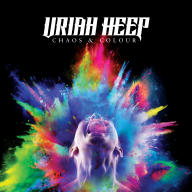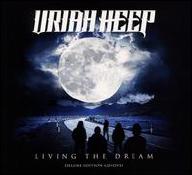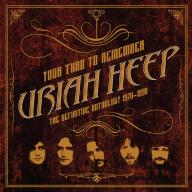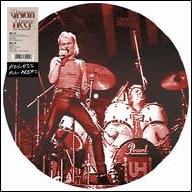Originally operating under the moniker Spice, Byron and Box eventually recruited guitarist, keyboardist, and vocalist Ken Hensley, bassist Paul Newton, and drummer Nigel Olsson, and made the transition to Uriah Heep, whom fans often refer to as simply Heep. With Box and Byron handling most of the songwriting duties, the newly minted quintet debuted their bottom-heavy guitar- and organ-driven blend of bluesy sonic might and innovative hard rock on 1970's Very 'Eavy...Very 'Umble (called Uriah Heep in the U.S.), which was released on Vertigo Records. Initially panned by critics, the LP has since attained legendary status as an early heavy metal classic. Olsson would depart shortly after the album's release, making room for new drummer Keith Baker, who made his studio debut on the group's 1971 sophomore effort, Salisbury. The ambitious six-track set, which saw Hensley making a more substantial writing contribution, adopted a far more progressive stance than the band's previous outing, with the 16-minute title cut employing a 26-piece orchestra.
The group endured a flurry of lineup shake-ups -- Baker was replaced by Ian Clarke, whose role was then usurped by Lee Kerslake, while Gary Thain took over bass duties from Mark Clarke, who had succeeded Paul Newton shortly after the release of Look at Yourself in 1971 and before the arrival of their acclaimed third studio long-player, Demons and Wizards, in 1972. Widely praised as the band's breakthrough LP, it heralded a hugely successful run of albums (1972's The Magician's Birthday, 1973's Sweet Freedom, 1974's Wonderworld, and 1975's Return to Fantasy) that saw Uriah Heep perfect their gothic-infused metal and maintain a mostly stable lineup; future Asia frontman and King Crimson alum John Wetton joined the band on bass for the latter offering.
Wetton would stay on through 1976's fairly mainstream-sounding High and Mighty, but internal issues, due in part to David Byron's struggles with alcohol, were beginning to wear on the band. Wetton left the fold in 1977, and the group were forced to let Byron go, resulting in the release of Firefly, the first Uriah Heep effort to feature new vocalist John Lawton and former David Bowie bassist (and ex-Spider from Mars) Trevor Bolder, the latter of whom would stay with the group until his death in 2013. The band's sound began to change as well, with subsequent offerings like Fallen Angel and Conquest leaning more toward commercial AOR than progressive metal, though the band maintained a respectable level of popularity, especially in Germany. 1982 saw them enter into another phase, delivering a punchier, more pop-metal-oriented sound with Abominog, their 14th long-player and first of three outings to feature ex-Trapeze vocalist Peter Goalby.
While their audience declined as the years went on -- and pop culture norms waxed and waned -- Uriah Heep enjoyed a strong international presence, and continued to release quality albums via multiple lineup iterations that left Mick Box the sole original member. In 2017, the stalwart rockers began work on their 25th studio LP with Jay Ruston (Anthrax, Stone Sour). The result, Living the Dream, was issued in 2018 on Frontiers, and saw the group sticking to their tried-and-tested classic rock formula. Longtime drummer Lee Kerslake died on September 19, 2020, at the age of 73. Less than two months later, founding member Ken Hensley lost his life on November 4, 2020, following a brief illness; he was 75 years old. 2023 saw the release of the band's 25th full-length effort, Chaos Colour, which featured a lineup consisting of Mick Box, Phil Lanzon, Bernie Shaw, Dave Rimmer, and Russell Gilbrook. ~ James Christopher Monger, Rovi
















